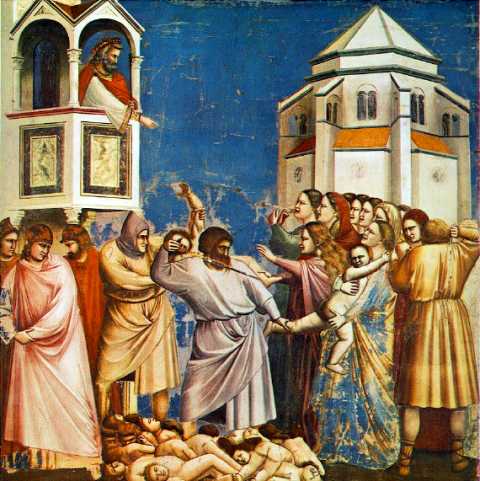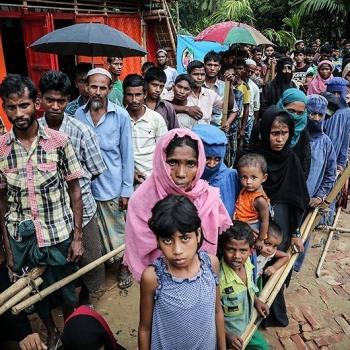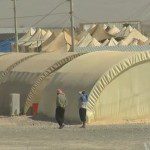![https://commons.wikimedia.org/wiki/File%3ASyrian_refugee_camp_on_theTurkish_border.jpg; By Voice of America News: Henry Ridgwell on the Turkish border [Public domain], via Wikimedia Commons](https://wp-media.patheos.com/blogs/sites/533/2016/09/Syrian_refugee_camp_on_theTurkish_border.jpg)
So over the weekend, Nick Kristof had an article asking, “Would you hide a Jew from the Nazis?” Now, as it happens, I read this over the weekend, and closed out, and when I attempted just now to re-read it I’d hit my monthly article limit. But the flavor of the article was very similar to something he’d written back in August, in which he said, “Anne Frank Today Is a Syrian Girl.” In both cases, his point was that the same moral obligation the United States had to accept Jewish refugees in danger of their lives due to Nazi persecution, the United States now has with respect to Syrians.
Now, that same case has been made by others, and I wrote about it back a year ago, but I’ll rephrase and repeat some of my points from the prior article and say a few new things.
First, in the immediate pre-war years, or, really, up until the Nazis moved westward, Americans could have felt reasonably comfortable with the statement, “It’s a European problem. Let France, the Netherlands, and Belgium take the refugees.” The infamous St. Louis, whose passengers sought refuge in Cuba, then in the United States, ended up offloading its passengers in those countries, and one really shouldn’t scold prewar Americans for failing to recognize those countries would fall like dominoes and were unsafe harbors.
But Kristof raises the issue (in his August article — which I opened first and was presumably article #10 for the month) that even as late as April 1941, when the Netherlands was occupied but the United States wasn’t yet at war with Germany, Otto Frank was desperately seeking a visa to the United States, or to Britain or Cuba.
Which does pose a meaningful, if hypothetical, question: what should the United States have done? Remember, they were on the verge of war, but were not actually at war. And, though Germany had prevented Jews in its own territory from leaving long before (I think), Kristof’s Frank family example implies that the Nazis were still letting Jews leave from occupied territories.
Now, in hindsight, we know that their ultimate aim was genocide, but it’s not really fair to say that Americans in the year 1941 should have known that. At this point, however, it was clear that the persecution was terrible, and, in Poland, the Nazis has already moved the Jewish population into ghettos, and, while I’m not sure exactly when they started up, the Einsatzgruppen were certainly in operation in the summer of 1941.
So the question I asked back a year ago was this: should the United States have, indeed, established an emergency rescue plan, to bring over every last Jew whose departure the Nazis would have permitted? Polish Jews, Dutch Jews, French Jews, even German Jews, if permission could have been managed, though likely only upon payment of a ransom.
Never mind the political feasibility of a program like this, or the cost. Would this have been the moral answer?
In the end, December 1941 wasn’t too far away and, in the meantime, the United States was drawing closer to war with the lend-lease program.
Second, is this really comparable to the situation today?
When we say, “Syrians,” were are really speaking of three groups of people: those in refuge camps, in stable but unpleasant living situations; those in rebel- or government-occupied territory, facing various kinds of persecution there; and those in active war zones.
Now, as I said, I can’t tell you any longer which of these three groups Kristof was referring to, but let’s address these three:
Those in refugee camps are not the “new Anne Franks” — they don’t like their present living situations, and understandably so, but the biggest need, and the best way to help the most of these individuals, is not refugee resettlement, but directing more financial resources to those refugee camps. After all, 10,000 Syrians in the United States is a drop in the bucket compared to the 60 million refugees and internally displaced folk worldwide. (Which I also wrote about back last November: “So what about the other 59,400,000?“)
With respect to those in active war zones, well, I don’t see how refugee resettlement is an answer here. It’s a frickin’ war. If we want to let the multiple parties fight it out amongst themselves, then there will inevitably be pictures of injured children coming our way. If we want to put a stop to the war, we have to make up our minds to do so, and act with more resolve than at present. And we have to ask the question: what’s our ultimate goal? Is it to bring the rebels to victory? That’s not working out too well, both militarily, and because we’re discovering that we’re doing a sucky job of picking rebels who themselves would govern justly. Or is it just to stop the war, because life under Assad was, in the end, better than life in a war zone, or a lifetime in a refugee camp? (Again, prior post: “Should we give up on Aleppo?“) And, if so, should we just let Russia have free rein to prop up Assad? — but no matter the answer to these questions, deciding to resettle more refugees wouldn’t help a single soul now trapped in Aleppo.
Third, well, actually, come to think of it, there’s another reason why none of these are “new Anne Franks” — they’re victims of war, not of a genocide campaign. Or, rather, the religious minorities (Christians, Yazdis, etc.) in Syria and Iraq have pretty much been forgotten about, all the more so now that the refugee-resettlement debate has been cast in terms of whether you’re an Islamophobe or not. What happened to the religious minorities I’m not sure, as there has not been a drop of news coverage in a long time; some time ago I remember reading that they weren’t eligible for resettlement because, being persecuted by Muslims in refugee camps, they avoided them entirely, and thus were not registered as “official” refugees. I don’t quite know what to make of it, but the debate about Muslim refugees seems to have erased the religious minorities entirely.
So, the bottom line is this: no, we are not killing Anne Frank all over again, but, on the other hand, there is no simple bottom line, either.
image: https://commons.wikimedia.org/wiki/File%3ASyrian_refugee_camp_on_theTurkish_border.jpg; By Voice of America News: Henry Ridgwell on the Turkish border [Public domain], via Wikimedia Commons













